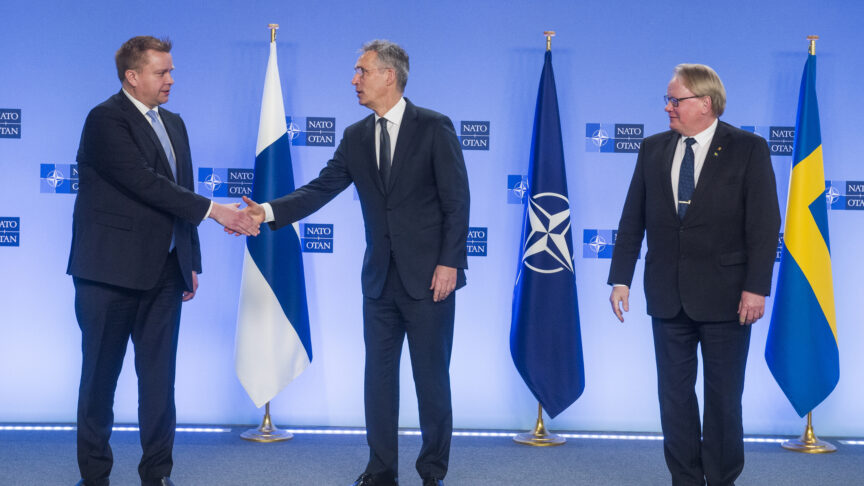NordNATO: Why the case for Finland to join NATO is stronger than ever
Finland has redefined its security interest, leading it inexorably towards NATO membership. If Sweden joins too, a significant new regional grouping within the alliance could emerge.
Writing for ECFR on 10 January, I set out three reasons why Finland may eventually join NATO. But I also argued that none was yet strong enough to prompt an application. Several months on, the strength of those reasons is no longer in doubt – and there are now at least two more that could compel Finland down this path.
The impact of Russia’s invasion of Ukraine
Concerns about Russia have always been the main reason for Finland to join NATO. Until recently, however, Russia was also the main reason not to join. For Helsinki, any immediate or short-term negative Russian reactions to NATO membership would have been manageable. But the long-term implications of a complete transformation of security policy from non-aligned to allied status represented uncharted territory for the country’s bilateral relations with Russia. And Finnish lawmakers long remained unwilling to take that step. Given Russia’s total disregard for the rules of international relations and international law, Helsinki has now lost any semblance of trust in Moscow. Finland needs to protect itself – and its leaders are concluding that the best way to do this is through a military alliance.
The second effective precondition for Finland to join NATO was for public opinion to decisively shift in favour. Following Russia’s 24 February invasion, this happened remarkably quickly. By the end of March, opinion polls showed that 61 per cent of Finns supported NATO membership, compared to 28 per cent in January (which was already a record high). In response, one political party after another has reformulated its stance on security and defence policy.
And, earlier this year, the third variable that might have prompted Finnish accession was whether Sweden were also to apply. In contrast to the moment when the two countries joined the European Union in the early 1990s, Sweden has not yet made the first move. And, if recent media reports prove accurate, it may even be Finland that does so this time. But it is important for Finland to have Sweden join as well, and preferably to do so at the same time, so that Helsinki is not faced with Russian countermeasures alone.
Clearly, this change in Finland’s position has been both fast and profound. NATO is the best option in an unprecedentedly threatening situation. Economic relations with Russia have transformed from a business opportunity for Helsinki into a burden. And any former political goal of searching for common interests and areas of cooperation with Russia now appears nonsensical. Furthermore, a country’s international image matters. So much so, in fact, that in a television interview on 26 March, Finland’s president, Sauli Niinistö, underlined not only the potential of NATO membership to deter Russia, but also its likely positive impact on international perceptions of Finland.
Fresh motives
One new element in Finland’s NATO debate is that the country’s leaders are now prepared to act directly against Russia’s demand that its small neighbour stay out of the alliance. There is a renewed alertness to the fact that, if Finland does not join NATO now, in the future it will have less “freedom of movement” – the long-cherished basis of Finnish security and defence policy. Thus, Finland’s room for manoeuvre would now be best protected within the alliance rather outside it, which was the previous consensus. A new Finnish government report on changes in the security environment makes explicit this new assessment of the country’s interests:
a situation where Russia aims to build a sphere of influence through demands and military means, failing to react to the changes in the security environment could lead to changes in Finland’s international position and a narrowing of Finland’s room for manoeuvre.
Two additional aspects have emerged that may prompt Finnish leaders to act. Firstly, as a NATO member, Finland could influence the alliance from within. NATO’s intergovernmental nature would suit Helsinki well in this respect: since decisions are based on consensus, Finland would not face domestic criticism for having to accept ways of participating in NATO activities that it did not necessarily support.
There is a renewed alertness to the fact that, if Finland does not join NATO now, in the future it will have less “freedom of movement” – the long-cherished basis of Finnish security and defence policy.
Secondly, NATO membership would have positive consequences for Nordic cooperation, which enjoys remarkable popularity in the public opinion of Nordic countries. Any boost to ‘Norden’ – a term used across the five Nordic states to describe them – should therefore be welcome for policymakers and publics alike. Furthermore, Norden would bring this long tradition of cooperation (particularly between Sweden and Finland) to NATO.
Indeed, NATO membership for all five Nordic countries would represent a significant new grouping, contributing to a new form of regionalism within the alliance. Swedish journalist PM Nilsson’s editorial in Dagens Industri on 24 April even goes so far as to dub this ‘NordNATO’ – an important strategic entity in which Sweden would play a central role. And editor-in-chief of Finnish newspaper Helsingin Sanomat, Kaius Niemi, has written about the potential for a Nordic bastion in the alliance.
NATO will undoubtedly have noted that new types of subregionalism could be both useful and problematic as the alliance evolves. For the Finns and the Swedes, however, this is a welcome and reassuring new perspective on how NATO membership could look. If the two countries submit applications this month, their departure from non-alignment will be significant and irreversible. However, it also has the potential to strengthen Norden and protect the region’s future integrity.
The European Council on Foreign Relations does not take collective positions. ECFR publications only represent the views of their individual authors.
